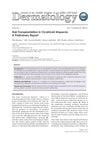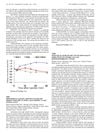
A woman in Sri Lanka was diagnosed with lupus after presenting with protein loss from the gut and other symptoms.
 March 2023 in “bioRxiv (Cold Spring Harbor Laboratory)”
March 2023 in “bioRxiv (Cold Spring Harbor Laboratory)” Scientists can now create skin with hair by reprogramming cells in wounds.
 December 2022 in “Research Square (Research Square)”
December 2022 in “Research Square (Research Square)” Key genes linked to immune response are upregulated in hair follicles and skin tissues in chronic discoid lupus erythematosus.
 October 2022 in “Journal of experimental and clinical medicine”
October 2022 in “Journal of experimental and clinical medicine” Repurposing existing drugs for COVID-19 shows promise but requires more research to confirm effectiveness.
 October 2022 in “Research Square (Research Square)”
October 2022 in “Research Square (Research Square)” Key genes linked to immune response are highly active in lupus-affected hair follicles.
 June 2021 in “bioRxiv (Cold Spring Harbor Laboratory)”
June 2021 in “bioRxiv (Cold Spring Harbor Laboratory)” KIF18B is important for correctly positioning cell division machinery in skin cells, affecting hair follicle development.
 November 2019 in “Harper's Textbook of Pediatric Dermatology”
November 2019 in “Harper's Textbook of Pediatric Dermatology” The document is a detailed medical reference on skin and genetic disorders.

The document concludes that non-endocrine alopecia in pets varies in treatment effectiveness and often has a poor prognosis, especially in cats.
 July 2018 in “Elsevier eBooks”
July 2018 in “Elsevier eBooks” Some drugs can cause reversible hair loss, but certain chemotherapy drugs may lead to permanent hair loss; drugs can also change hair color and texture.

 January 2018 in “Stem cell biology and regenerative medicine”
January 2018 in “Stem cell biology and regenerative medicine” ATP-dependent chromatin remodeling is crucial for skin development and stem cell function.
 December 2017 in “Elsevier eBooks”
December 2017 in “Elsevier eBooks” The vitamin D receptor helps maintain hair and bone health even without binding vitamin D.

Stem cells regenerate tissues and their behavior varies by environment, suggesting the hematopoietic system model may need revision.
 November 2017 in “Research Journal of Health Sciences”
November 2017 in “Research Journal of Health Sciences” Skin infections and eczema were most common in all ages, acne in teens and young adults, and nutritional skin problems and infestations in children.
 August 2017 in “Journal of epidemiological research”
August 2017 in “Journal of epidemiological research” Cancer rates are increasing in developed countries, with estrogen, aging, low vitamin D3, and HPV infection as common causes.

Human hair follicle cells can be turned into stem cells that may help clone hair for treating hair loss or burns.
 September 2015 in “International Journal of Dermatology”
September 2015 in “International Journal of Dermatology” Skin diseases are common in HIV patients and could help detect HIV early in Ethiopia.

The document concludes that severe trauma can cause temporary hair loss, known as Telogen Effluvium, which usually resolves without treatment.

Chemicals and stem cells combined have advanced regenerative medicine with few safety concerns, focusing on improving techniques and treatment effectiveness.
 January 2014 in “Journal of the turkish academy of dermatology”
January 2014 in “Journal of the turkish academy of dermatology” Hair transplantation is safe and effective for permanent hair loss due to scarring, with high patient satisfaction.
 January 2014 in “Journal of Investigative Dermatology”
January 2014 in “Journal of Investigative Dermatology” Proteins like aPKC and PDGF-AA, substances like adenosine and ATP, and adipose-derived stem cells all play important roles in hair growth and health, and could potentially be used to treat hair loss and skin conditions.
 September 2013 in “Experimental Dermatology”
September 2013 in “Experimental Dermatology” The document concluded that stem cells are crucial for skin repair, regeneration, and may help in developing advanced skin substitutes.
 September 2013 in “Molecular Biology”
September 2013 in “Molecular Biology” The document suggests that activating autophagy might help with regeneration by removing old and damaged cells.

Wound healing is complex and requires more research to enhance treatment methods.
 January 2012 in “Human health handbooks”
January 2012 in “Human health handbooks” Low-level light therapy is FDA-approved for male pattern hair loss, increases hair count and strength, and is considered safe for use.
 April 2010 in “The Journal of Urology”
April 2010 in “The Journal of Urology” Human prostate cells produce more WISP1/CCN4 when there's not enough oxygen.
 January 2006 in “Advances in developmental biology”
January 2006 in “Advances in developmental biology” The Hairless gene is crucial for healthy skin and hair growth.
 April 2003 in “Experimental Dermatology”
April 2003 in “Experimental Dermatology” The workshop highlighted the genetic links and psychological impacts of hair loss and skin disorders.
 January 2000 in “Expert Opinion on Therapeutic Patents”
January 2000 in “Expert Opinion on Therapeutic Patents” The document highlights various patents for new compounds with potential treatments for multiple diseases, including cancer, hormonal disorders, and diabetes.
 September 1998 in “Journal of The European Academy of Dermatology and Venereology”
September 1998 in “Journal of The European Academy of Dermatology and Venereology” Aging affects hair density and skin health, and Behcet's disease, a complex condition with no specific test, involves sores and systemic issues, treated with various medications.





























